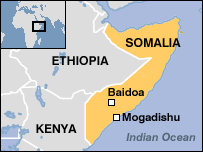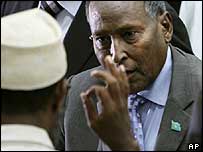Friday, June 23, 2006
BBC
A Swedish cameraman has been shot dead during a huge rally in the Somali capital, Mogadishu, held to back Thursday’s peace agreement.
A BBC correspondent says a lone gunman shot the Swedish man in the heart, in the middle of a crowd of thousands.
The peace deal was agreed in Sudan by the interim government and the Islamist group which controls the capital.
Both sides have agreed to recognise each other and stop fighting, but some key issues remain unresolved.
It is not clear why the cameraman was targeted but correspondents say it will affect the Union of Islamic Courts’ claims to have restored security to Mogadishu, which they seized two weeks ago.
Somalia’s President Yusuf |
The Islamists’ opponents have blamed them for a series of assassinations in recent years, including of BBC journalist Kate Peyton.
The AFP news agency reports that an unnamed cleric at the demonstration immediately condemned the killing.
“We are against the killing of a journalist who is a guest,” he said.
“This person deserves to be punished for killing somebody for no reason. With the help of Allah we will find him and punish him accordingly.”
Peace deal
The BBC’s Hassan Barise in Mogadishu says the Swedish man was shot once with a pistol during confusion while an Ethiopian flag was set on fire.
The marchers were also protesting against the suggestion that foreign peacekeepers be deployed in Somalia.
 |
The seven-point deal made no mention of this major disagreement between the two sides.
Another issue not addressed is whether the Islamists will join the interim government.
The Islamic courts leader has said the movement does not want to establish its own government, but our correspondent says many Somalis feel that it does.
But our correspondent says nobody was expecting a deal after only one day of talks in Sudan.
The two sides also agreed to stop “media campaigns” against each other and to meet again on 15 July, when the outstanding issues may be addressed.
‘No extremism’
Sudan’s President Omar al-Bashir described the accord as “the beginning of the end of conflicts in Somalia.”
President Yusuf was in the Sudanese capital, Khartoum, for the talks but the agreement was signed by Foreign Minister Abdullahi Sheekh Ismail.
 President Yusuf only controls a small part of Somalia |
Mr Yusuf said: “We have no interest in shedding any blood, and we will seek every possible way to preserve the life of the Somalis.
“This is your chance to end the suffering and start developing. Take my advice, and be aware: war leads nowhere.”
Mr Ibrahim moved to calm fears that the Union of Islamic Courts could provide a safe haven for Islamist fighters.
“There’s no extremism in Somalia and no terrorist element in Somalia. Anyone who wanted to check this, he can come and see with his own eyes,” he said.
There have been fears of conflict between the Islamic courts, which control much of southern Somalia, and the interim government, based in Baidoa, 200km north of the capital, Mogadishu.
These fears increased last weekend after the Islamists said Ethiopian troops had crossed the border, apparently in support of Mr Yusuf’s government.
International pressure is mounting for both sides to negotiate a peaceful settlement and to establish Somalia’s first effective national government for 15 years.
Source: BBC, June 23, 2006






